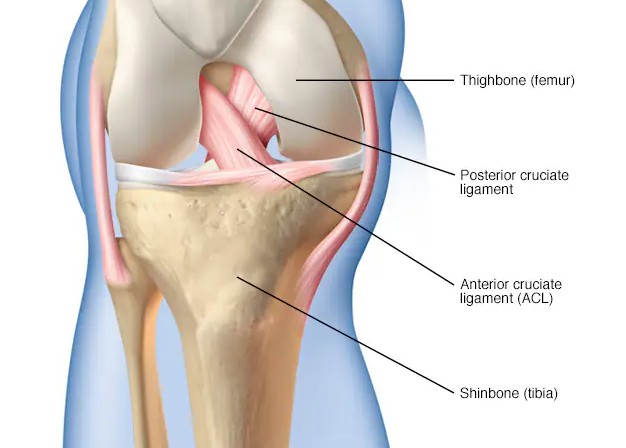
Understanding Knee Tears: Cruciate Ligament Injuries
In last week’s post, we began discussing tendon and ligament tears, starting with the Achilles tendon. Today we will be moving up the leg to the knee – an area where we tend to see a lot of ligament tears. There is plenty to unpack with each one of these ligaments, and they could each get their post. Therefore, over the next few posts, I will be summarizing these ligaments in pairs. Today, we will primarily focus on summarizing the tears of two of the four major ligaments of the knee – the Cruciate ligaments: the ACL and PCL. In the future, I may dive into greater detail into each one of these ligaments and their rehabilitation.
The Two Major Cruciate Knee Ligaments
Ligaments are tough, fibrous bands that connect bones and stabilize joints. In the knee, four primary ligaments are critical to its function: we have two cruciate and two collateral ligaments. As mentioned today, we will focus on the ACL and PCL.
- ACL (Anterior Cruciate Ligament)
- PCL (Posterior Cruciate Ligament)
ACL Tear (Anterior Cruciate Ligament):
Function:
- The ACL connects the femur (thigh bone) to the tibia (shin bone) and prevents the tibia from sliding too far forward. The ACL also aids in controlling rotational movements during pivoting or cutting.
Common Causes of Injury:
- Sudden stops or changes in direction (pivoting, cutting)
- Hyperextension of the knee
- Landing awkwardly from a jump
- Direct blows to the knee
Grades of ACL Injury:
- Grade I (Mild): Microscopic fibers stretched; joint is normally stable.
- Grade II (Moderate): Partial tear; joint may feel unstable.
- Grade III (Severe): Complete rupture; knee becomes unstable, especially during pivoting.
Treatment:
- Non-surgical: Older, sedentary individuals or partial tears
- Surgical reconstruction: Tendon graft (patellar, hamstring, quad)
- Post-surgery rehab and physiotherapy are critical for success in full recovery of knee function
Recovery timelines for the ACL are based on many factors, as a general rule of thumb:
- Return to light activity: 3–4 months
- Sports-specific drills: 6–9 months
- Return to play (RTP): 9–12 months, based on strength and functional tests
PCL Tear (Posterior Cruciate Ligament):
Function:
- The PCL prevents the tibia from moving too far backward under the femur. It aids in the stability of the knee during activities like squatting, walking downhill, or descending stairs.
Common Causes of Injury:
- Dashboard injury in car accidents (knee hits dashboard)
- Falling on a flexed knee
- Hyperflexion or hyperextension with force
- Sports collisions
Grades of PCL Injury:
- Grade I (Mild): Minor stretch, no instability
- Grade II (Moderate): Partial tear – joint may feel unstable; yet, usually with PCL injuries, instability isn’t felt
- Grade III (Severe): Complete tear, often with other ligament damage
Treatment:
- In the case of PCL tears, especially Grades I & II, conservative treatment is considered. Physiotherapy is important for revitalizing function, improving range of motion, and strengthening the muscles around the knee. Depending on the case, a knee brace may be recommended.
- In grade III injuries, surgery may be considered, especially in athletes or with combined injuries; however, isolated PCL injuries recover well non-surgically, within 6-10 months.
Conclusion:
I hope that gives a quick insight into knee cruciate ligament injuries. The cruciate ligaments are important to the functioning of the knee; therefore, if you feel something’s not right with your knee, listen to your body and seek care early. Consult with one of the physiotherapists at Kamloops Physiotherapy & Sports Injury Centre, as they can guide you through a specific, individualized rehabilitation program that will improve your chances of a full recovery. In our next post, we will highlight the other 2 of the 4 major ligaments, the collateral ligaments: the MCL and LCL.
This blog post was written by physiotherapist Jacob Coelho. To book an appointment with Jacob or one of our other experienced therapists, call 250-314-0788.
